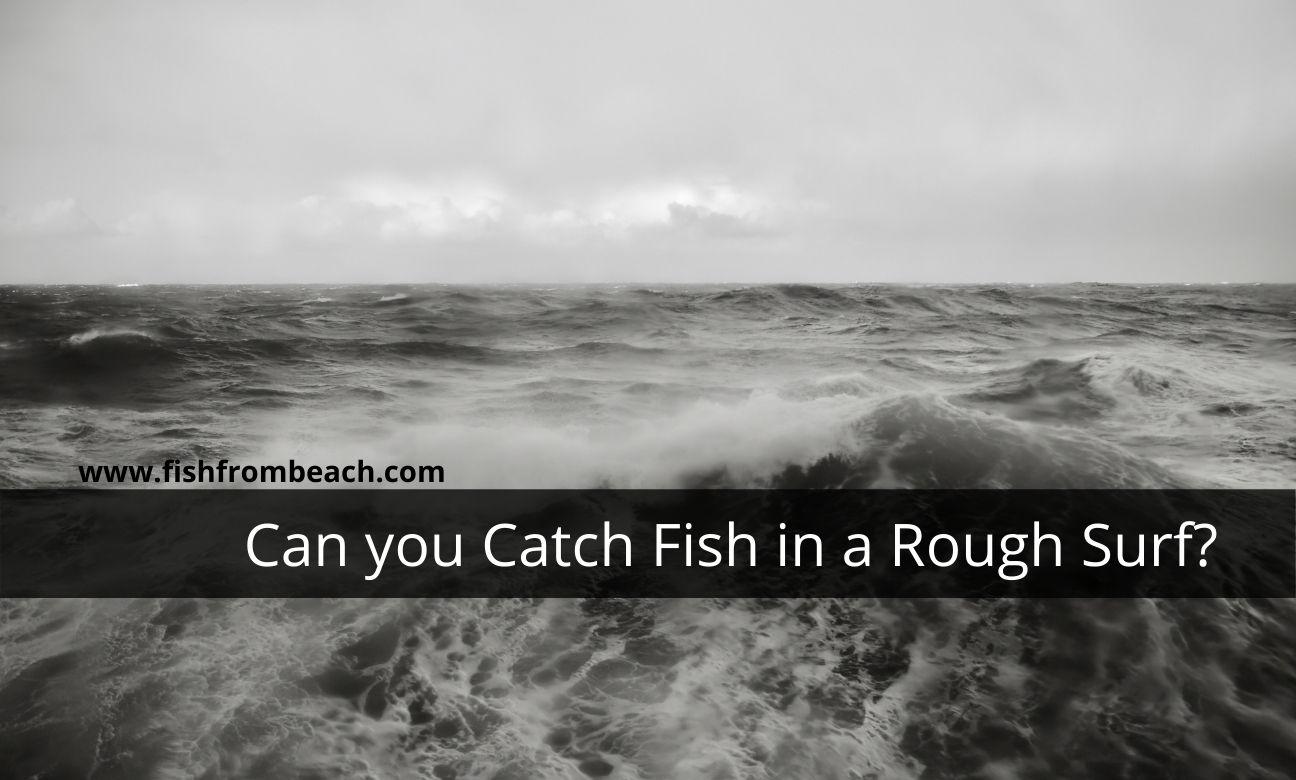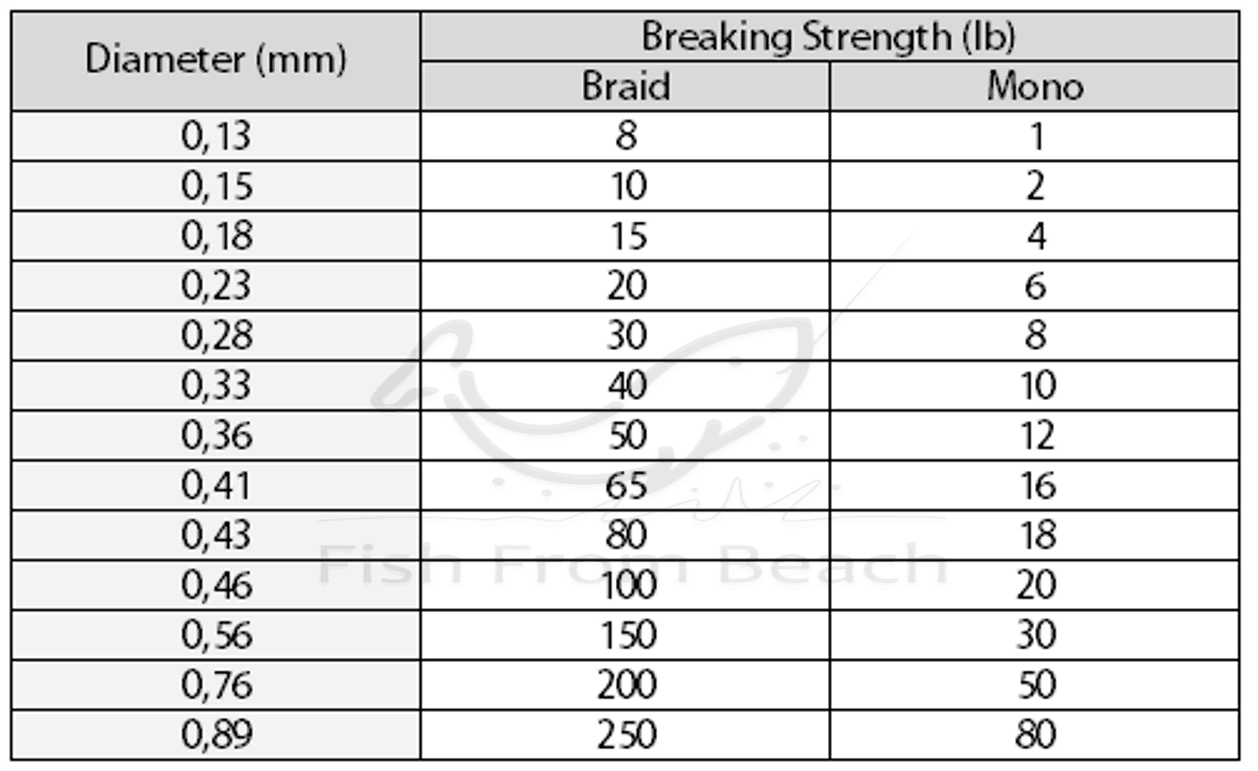
Rough surfs are not only unattractive for swimmers and divers, but they can also be uninviting for fishermen, especially the beginners.
For novice anglers, a calm beach with clear waters and gentle waves is more tempting to cast the rod and catch some fish, while an agitated beach, on the other hand, somehow gives the impression that the surf is deserted and no fish will be there to take the bait.
So is that true ? are choppy surf conditions bad for fishing ? and can you catch fish in a rough surf ?
The short and confident answer is YES…Absolutely!
You will be able to catch a lot of fish in a rough surf because choppy surf conditions provide fish with more favorable conditions to leave the shelter, approach the shoreline, and feed within your casting range, making it an ideal time to pack your gear and go fishing.
In this article, we will discuss all the reasons why rough surfs are great for fishing ? what gear and bait to use when the beach is agitated ? and also when fishing a rough surf becomes a bad idea ? So keep reading 😉
Why a rough surf is good for surf fishing ?
It provides more feeding opportunities
A moving surf stirs up more food elements on the sea bed and makes them easily accessible to the fish.
Sand fleas, shellfish, and all the other nutrients buried in the sand or hidden behind the rocks and the weed, get more exposed during moving waters and create a frenzied environment for the fish.
That’s why casting bait during a rough surf is generally more rewarding. Fish will be there competing for the exceptional food availability and they will strike every opportunity without much thinking or hesitation. The outcome of this is obvious : more bites, and more catches.
Not only that, but offshore predatory fish also approach the shoreline during an agitated surf because they know that there will be an abundance of prey competing for the food provided by the moving waters.
Moving waters also disorientate small baitfish and make it hard for them to swim and avoid nearby threats. This is a great advantage for larger fish as it becomes easier and less energy-consuming to pursue and catch prey.
Similarly, offshore predators know that too and get closer to enjoy the easy food supply.
So as a summary, moving waters activate the food chain in the surf zone by providing more feeding opportunities to the small baitfish that get active and leave the shelter for food, and as a result, become easy prey for the larger predators too.
Consequently, fishing during a rough surf will bring nothing but more bites and more rod shakes 😉
It makes fish more stressed to feed
A rough surf is generally associated with bad weather conditions, which in turn, are associated with low atmospheric pressure.
This alone can have a huge positive impact on your productivity as a surf angler. Why ? Because fish are able to feel changes in the atmospheric pressure, and when they do, they get stressed and start to feed more aggressively.
How do fish feel the changes in pressure ? Well, I am not 100% sure if this is scientifically true, but I have read in different sources that fish feel the pressure thanks to their bladder that expand during low pressure and shrink during high pressure.
Typically, fish want their bladder to always remain small because when it expands, it applies pressure on the other organs of the body and this makes them uncomfortable, sluggish, and unwilling to eat.
In simple words, fish fear low pressure.
What’s interesting here is that because fish fear low pressure, they will feed more aggressively when the pressure begins to drop. Why ? Well, simply because they will be afraid that the pressure gets too low and therefore become unable to eat due to their dilated bladder.
In other terms, fish get stressed during bad weather and try to eat as much as possible to have more food reserves in case the atmospheric pressure gets too low for a long period of time.
And as said before, a rough surf is usually associated with low atmospheric pressure. It is, thus, a great time to cast some bait and take advantage of the scarcity behavior of fish.
We have discussed more details about the relationship between fishing and pressure in a previous article. I invite you to give it a look because you will learn a lot of things there 🙂
It provides a better bait presentation
The last advantage of a rough surf is that it makes your terminal tackle less visible in the water.
Agitated water turns and stirs up the weed and sand particles on the seafloor and get as a result colorful and cloudier. This hurts the eyesight power of the fish and makes them less likely to notice your terminal tackle on their way to take the baits.
Fishing clear waters, on the flip side, make it easy for fish to see your sinker, your hook, your swivels, and all the other spooky objects of your rig. As a result, they get scared and hesitate many times before striking your offering.
What tackle to choose when the surf is rough ?
The biggest challenge when fishing a rough surf is to keep your terminal tackle stable and prevent the current from drifting your baited rig out of the strike zone and pushing into deserted areas where no fish look for food.
Agitated surfs are usually associated with strong winds and rough currents. The tackle to use in such conditions should, therefore, help to minimize the current/wind effect and keep your offering where the interesting things happen.
The first thing to consider here is the casting weight. Your lead has to be heavy enough in order to withstand the current and keep the baited rig where it should be.
Generally speaking, a 3-4 oz sinker is enough to cope with most surf conditions. That said, consider carrying heavier sinkers with you so you can upgrade the weight in case you need more stability.
Learn more about the optimal casting weight for surf fishing.
Your rigs should also be minimalistic and simple. Rigs with multiple snoods and attachments tend to be less stable in rough surfs and should, therefore, be avoided.
A simple fish finder rig or Carolina rig is all you need to catch fish in a rough surf.
The other thing to consider when fishing an agitated surf is the line diameter. As a rule of thumb, the thicker the line, the more it is subject to the current/wind pressure. A thin line, on the other hand, cuts better on the water and offers better stability and resistance against the current.
Personally, If I’m going to fish a strong current, I would always go for diameters under 0.25 mm.
Now, of course, the lower the diameter the better, but keep in mind that your line should be strong too. That’s why braid is the best option for choppy surfs.
Braided lines, as shown in the following table, provide very low diameters without compromising the strength.

The last thing to watch before casting the line into a rough surf is the length of your leader. Long leaders receive more pressure from the current and as a result hurt the stability of your terminal tackle. Keep your leader short. 1 ft (12 inches) is all you need for that.
More about the best leader length for surf fishing.
What bait to use when the surf is rough ?
The most important criteria to consider when choosing the bait for a rough surf is the odor.
Keep in mind that rough surf conditions make the water colorful and muddy and therefore difficult for fish to see through. So in such conditions, you need to address the smell sense of the fish and not their eyesight. In other words, your bait has to be smelly to draw the attention of fish and make them approach your offering.
Cut bait is the best way here because cutting the bait maximizes the smell and releases more oils and liquids that attract hungry fish.
The options are many : sardine, mullet, mackerel, bonito, shrimp, prawn, squid… Pick whatever is available in your area and you should be good to go.
Personally, sardine is my favorite option when fishing a rough surf.
Sardine is naturally smelly and cutting it produces even more odors and oils making it very easy to find in murky waters. Mackerel is also a good choice thanks to its high oil intake.
Learn 5 methods to hook sardine dead bait.
What about live bait ?
Well, I have to say that a rough surf is among the rare conditions where live bait is a bad idea. Don’t get me wrong. Live bait is always a great choice, but when fish can’t see clearly in the water, expect more bites and catches using a smelly chunk of cut bait.
When does a rough surf become a bad idea ?
After discussing all the benefits of agitated beaches, we must also mention that choppy surf conditions are not always rewarding.
First of all, you should never be on the beach if the swell is putting your life at risk. In other words, if the beach is so tight that you can’t move away from the waves, then report fishing for another day or another location.
Do not underestimate the strength of the waves even if they seem gentle and “not that strong”. I have seen, heard, and read about many tragic stories of anglers that got dragged out of their soles by the waves, just because they under judged the power of the swell.
Personally, I would never cast the rod if the waves exceed 4 ft.
On top of that, even sizeable fish struggle to swim in extremely high swells and strong currents. So there will be very few to fish for in a “too rough” surf anyway.
Fishing will also produce poor rewards if the beach was in bad condition for too long.
As we said above, the drop in atmospheric pressure makes fish stressed and more willing to eat. But when the barometer remains in a low reading for too long, fish get uncomfortable and migrate elsewhere in search of better conditions to relieve their expanded bladders.
So as a general rule, avoid fishing if the surf was in choppy conditions for more than 3 days in a row.
Summary
The final takeaway is yes, you can catch a lot of fish in a rough surf.
Choppy surf conditions provide fish with more cover and feeding opportunities to approach the shoreline and look for food. They also make the fish stressed and more willing to feed out of fear of starvation in case the conditions get worse.
So the next time you head to the coast and find an agitated surf with colorful waters, don’t be discouraged and return home. This may be just what you need to enjoy a prolific day and a good catches count.
Going home, however, is the smart decision if the beach conditions are too bad that they become life-threatening.
An extremely high swell with strong winds can put your safety at risk and should, therefore, be avoided. Moreover, an extremely rough surf is not productive for fishing anyway. Why ? because a very low atmospheric pressure makes fish uncomfortable and forces them to escape elsewhere to relieve their bladders.
Some recommended surf fishing gear(*)
Note (*): If you make a purchase through links from this website, we may get a small share of the sale from Amazon or other similar affiliate programs.
Surf Fishing Survey
Help us provide you with better content by answering simple questions about your surf fishing experience and knowledge.
We will put the collected responses together and turn them into valuable information that will help you catch more fish from shore 😉
Note: No personal information will be collected with your answer.

